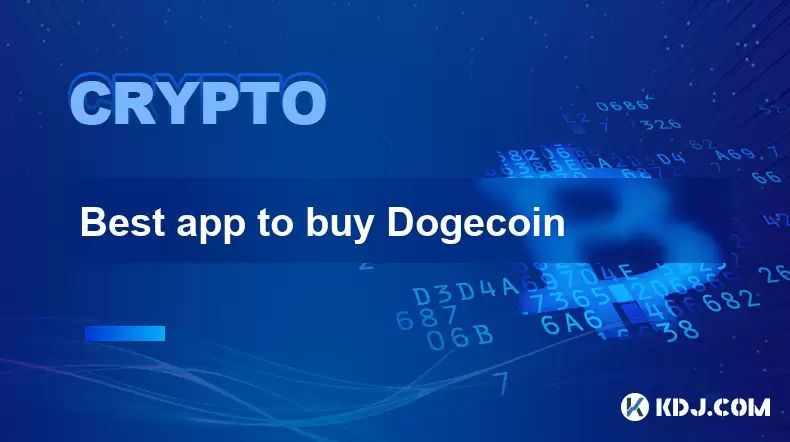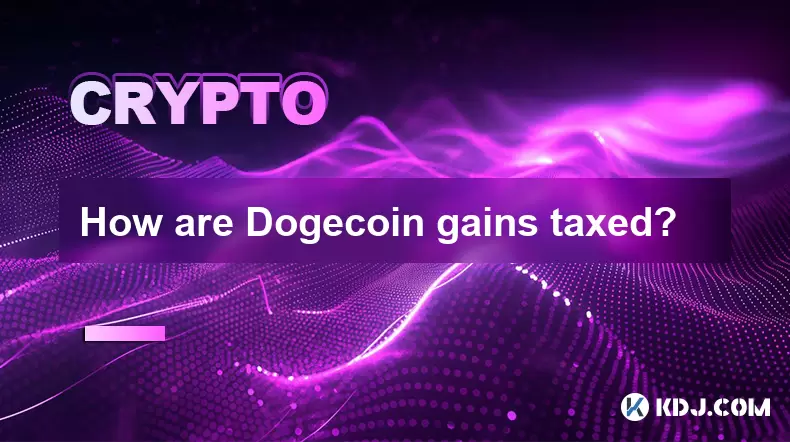-
 bitcoin
bitcoin $87959.907984 USD
1.34% -
 ethereum
ethereum $2920.497338 USD
3.04% -
 tether
tether $0.999775 USD
0.00% -
 xrp
xrp $2.237324 USD
8.12% -
 bnb
bnb $860.243768 USD
0.90% -
 solana
solana $138.089498 USD
5.43% -
 usd-coin
usd-coin $0.999807 USD
0.01% -
 tron
tron $0.272801 USD
-1.53% -
 dogecoin
dogecoin $0.150904 USD
2.96% -
 cardano
cardano $0.421635 USD
1.97% -
 hyperliquid
hyperliquid $32.152445 USD
2.23% -
 bitcoin-cash
bitcoin-cash $533.301069 USD
-1.94% -
 chainlink
chainlink $12.953417 USD
2.68% -
 unus-sed-leo
unus-sed-leo $9.535951 USD
0.73% -
 zcash
zcash $521.483386 USD
-2.87%
What is the technical basis of Dogecoin? How does it work?
Dogecoin uses the Scrypt algorithm and Litecoin's blockchain, employing a proof-of-work mechanism for transaction verification. Its inflationary model and strong community influence its value more than its relatively simple technical design.
Mar 11, 2025 at 08:51 am

- Dogecoin's technical basis rests primarily on its use of the Scrypt hashing algorithm and its adaptation of the Litecoin blockchain.
- Dogecoin operates using a proof-of-work consensus mechanism, requiring miners to solve complex cryptographic problems to validate transactions and add new blocks to the blockchain.
- Its transaction process involves broadcasting transactions to the network, verification by miners, and addition to the blockchain for permanent record.
- Dogecoin's inflationary nature, with a continuously increasing supply, distinguishes it from deflationary cryptocurrencies.
- While technically simple, Dogecoin's community and meme-driven popularity significantly influence its value and adoption.
Dogecoin, while seemingly simple, possesses a technical foundation built upon established blockchain technology. Unlike many cryptocurrencies that develop entirely new protocols, Dogecoin leverages existing infrastructure, specifically adapting the Litecoin blockchain. This means it shares many technical similarities with Litecoin, including the use of the Scrypt hashing algorithm. Scrypt is a memory-hard algorithm, meaning it requires significant amounts of RAM to solve its cryptographic puzzles, making it more resistant to certain types of attacks compared to algorithms like SHA-256 used by Bitcoin.
The core of Dogecoin's operation lies in its use of a proof-of-work (PoW) consensus mechanism. This means that "miners" compete to solve complex computational problems. The first miner to solve the problem adds the next block of validated transactions to the blockchain and receives a reward in Dogecoin. This process ensures the security and integrity of the Dogecoin network, preventing double-spending and fraudulent transactions. The difficulty of these problems dynamically adjusts to maintain a consistent block generation time, typically around one minute.
How are transactions processed in the Dogecoin network? The process involves several steps:
- Transaction Broadcasting: A user initiates a transaction by sending Dogecoin from one address to another. This transaction is then broadcast across the Dogecoin network.
- Transaction Verification: Miners receive the broadcast transaction and verify its legitimacy, checking for sufficient funds in the sender's wallet and ensuring the transaction is correctly formatted.
- Block Inclusion: Once verified, the transaction is included in a block of transactions by a miner who successfully solves the cryptographic puzzle.
- Block Addition to the Blockchain: The new block, containing the verified transaction, is added to the ever-growing blockchain. This makes the transaction permanent and publicly verifiable.
Dogecoin's inflationary nature is a key technical difference from some other cryptocurrencies. Unlike Bitcoin, which has a fixed maximum supply, Dogecoin has an inflationary supply. This means that new Dogecoins are continuously created and added to the circulating supply through the block reward system given to miners. This inflationary model has contributed to its meme-driven, community-focused nature.
The technical simplicity of Dogecoin, however, shouldn't overshadow its significance. While not as technically complex as some other cryptocurrencies, its use of established blockchain principles, combined with its large and active community, has allowed it to maintain a notable presence in the cryptocurrency landscape. Its relatively low transaction fees and fast transaction times also contribute to its appeal.
Dogecoin's security relies on the distributed nature of the blockchain and the computational power of its miners. The more miners participating in the network, the more secure it becomes. This decentralized nature makes it significantly resistant to single points of failure or manipulation by any single entity. The Scrypt algorithm also contributes to its security, increasing the cost for malicious actors to attempt attacks.
The use of the Scrypt algorithm offers both advantages and disadvantages. While offering increased resistance to certain attacks, it also consumes more energy compared to other algorithms. This energy consumption raises environmental concerns, a debate common within the cryptocurrency space.
The community aspect of Dogecoin plays a significant role in its success. Its playful mascot and its association with internet memes have fostered a strong and dedicated community that actively promotes and supports the cryptocurrency. This community engagement is a significant factor driving its adoption and market valuation, a factor not directly tied to the underlying technical specifications.
Frequently Asked Questions:Q: Is Dogecoin truly decentralized?A: While Dogecoin's blockchain is decentralized, meaning no single entity controls it, the distribution of mining power might influence its degree of decentralization. A concentration of mining power in a few hands could potentially raise concerns.
Q: How does Dogecoin's inflation affect its value?A: The continuous creation of new Dogecoins dilutes the existing supply, potentially impacting its value. However, factors like demand and adoption can offset this inflationary pressure.
Q: What are the environmental implications of Dogecoin mining?A: Like other PoW cryptocurrencies, Dogecoin mining consumes energy. The environmental impact depends on the energy sources used by miners and the overall efficiency of the mining process.
Q: Can Dogecoin be used for everyday transactions?A: While Dogecoin can be used for transactions, its volatility and lack of widespread merchant acceptance limit its practical use for everyday purchases compared to traditional currencies.
Q: How does Dogecoin compare to other cryptocurrencies like Bitcoin or Litecoin?A: Dogecoin shares technical similarities with Litecoin (using Scrypt), but differs significantly in its inflationary model and community focus. Compared to Bitcoin, it is less technically complex and has a larger, more meme-driven community.
Q: Is Dogecoin a good investment?A: The value of Dogecoin is highly volatile and speculative. Any investment decision should be based on thorough research and an understanding of the risks involved. It's crucial to consult a financial advisor before making any investment decisions.
Disclaimer:info@kdj.com
The information provided is not trading advice. kdj.com does not assume any responsibility for any investments made based on the information provided in this article. Cryptocurrencies are highly volatile and it is highly recommended that you invest with caution after thorough research!
If you believe that the content used on this website infringes your copyright, please contact us immediately (info@kdj.com) and we will delete it promptly.
- Wall Street Whales, DeFi Dynamos, and the Cross-Asset Surge: Decoding BTC, ETH, and Hyperliquid's Latest Plays
- 2026-02-01 13:00:02
- The Big Apple's Crypto Crunch: Dogecoin, Rugpulls, and the Elusive Opportunity
- 2026-02-01 12:55:01
- Bitcoin Tumbles: Trump's Fed Pick and Geopolitical Jitters Spark Price Drop
- 2026-02-01 12:45:01
- Bitcoin's Rocky Road: Inflation Surges, Rate Cut Hopes Fade, and the Digital Gold Debate Heats Up
- 2026-02-01 09:40:02
- Ethereum Navigates Bull Trap Fears and Breakout Hopes Amidst Volatile Market
- 2026-02-01 12:55:01
- Bitcoin Shows Cheaper Data Signals, Analysts Eyeing Gold Rotation
- 2026-02-01 07:40:02
Related knowledge

Bitcoincoin burning mechanism
Jul 20,2025 at 09:21pm
What is the Dogecoin burning mechanism?The Dogecoin burning mechanism refers to the process of permanently removing DOGE tokens from circulation by se...

How to earn free Bitcoincoin?
Jul 19,2025 at 10:08pm
What is Dogecoin and Why Earn It?Dogecoin (DOGE) started as a meme-based cryptocurrency in 2013 but has grown into a widely recognized digital asset. ...

Is Coinbase a good wallet for Bitcoincoin?
Jul 19,2025 at 04:42pm
Understanding Coinbase as a Wallet Option for DogecoinWhen considering where to store Dogecoin, Coinbase is often mentioned as a potential option due ...

How to buy Bitcoincoin with PayPal?
Jul 23,2025 at 06:57am
Understanding the Basics of Buying DogecoinBefore diving into the process of buying Dogecoin with PayPal, it’s essential to understand what Dogecoin i...

Best app to buy Dogecoin
Jul 23,2025 at 03:08pm
What Is a Cryptocurrency Exchange and How Does It Work?A cryptocurrency exchange is a digital marketplace where users can buy, sell, or trade cryptocu...

How are Dogecoin gains taxed?
Jul 25,2025 at 07:01am
Understanding the Taxation of Dogecoin GainsWhen it comes to Dogecoin (DOGE), many investors are drawn to its meme-inspired branding and volatile pric...

Bitcoincoin burning mechanism
Jul 20,2025 at 09:21pm
What is the Dogecoin burning mechanism?The Dogecoin burning mechanism refers to the process of permanently removing DOGE tokens from circulation by se...

How to earn free Bitcoincoin?
Jul 19,2025 at 10:08pm
What is Dogecoin and Why Earn It?Dogecoin (DOGE) started as a meme-based cryptocurrency in 2013 but has grown into a widely recognized digital asset. ...

Is Coinbase a good wallet for Bitcoincoin?
Jul 19,2025 at 04:42pm
Understanding Coinbase as a Wallet Option for DogecoinWhen considering where to store Dogecoin, Coinbase is often mentioned as a potential option due ...

How to buy Bitcoincoin with PayPal?
Jul 23,2025 at 06:57am
Understanding the Basics of Buying DogecoinBefore diving into the process of buying Dogecoin with PayPal, it’s essential to understand what Dogecoin i...

Best app to buy Dogecoin
Jul 23,2025 at 03:08pm
What Is a Cryptocurrency Exchange and How Does It Work?A cryptocurrency exchange is a digital marketplace where users can buy, sell, or trade cryptocu...

How are Dogecoin gains taxed?
Jul 25,2025 at 07:01am
Understanding the Taxation of Dogecoin GainsWhen it comes to Dogecoin (DOGE), many investors are drawn to its meme-inspired branding and volatile pric...
See all articles
























![[Audio stories] Streamer Became a Billionaire Overnight After Buying One Junk Coin [Audio stories] Streamer Became a Billionaire Overnight After Buying One Junk Coin](/uploads/2026/02/01/cryptocurrencies-news/videos/origin_697eaa9a495ed_image_500_375.webp)

















































